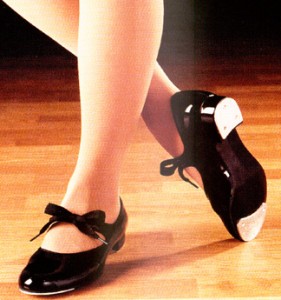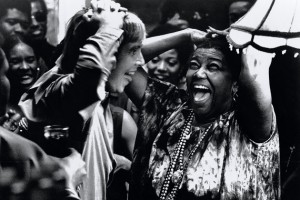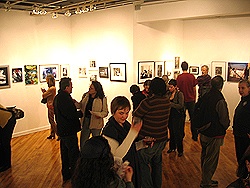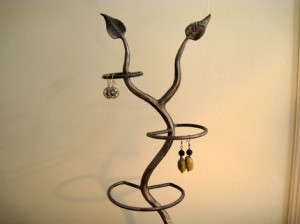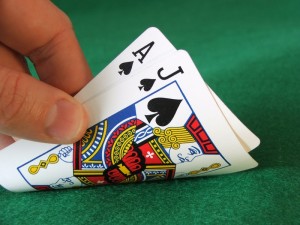 Sarah met singer, composer, and instrumentalist Judith Berkson at Barbes to talk about her beautiful new CD Oylam, due out next month on ECM Records. Stay tuned for news about her upcoming shows, including a May record release at Joe’s Pub.
Sarah met singer, composer, and instrumentalist Judith Berkson at Barbes to talk about her beautiful new CD Oylam, due out next month on ECM Records. Stay tuned for news about her upcoming shows, including a May record release at Joe’s Pub.
Sarah: What was your earliest exposure to music?
Judith: My dad is a cantor, and he was teaching me all the prayers by ear starting at age three. We had a family band – my mom played piano and we sang three-part harmony. My dad was really strict. He forced me to listen to opera, which at the time I resented, but now I’m sort of glad, because I love it. All the music we had growing up was Jewish music, cantorial recordings, klezmer. Those things stuck with me.
Sarah: When you sing, what kind of sound are you aiming for?
Judith: I want it to sound like someone is talking to you right in your ear. Simple, like recordings from the fifties. Now we have all this modern recording technology, but I love that old sound. It’s like you were right there.
Sarah: Your new CD has a lot of eclectic material. What’s the connecting thread?
Judith: It’s the culmination of four or five years of work. I wanted to explore all the forms I enjoy – lieder, jazz, cantorial music, and the quirky, atonal songs I write – to take them and make them personal. I want to connect directly to the essence of each thing. The editing process was very important. I was trying to cut out anything inessential, like whittling down a piece of wood.
Sarah: I love the Yiddish piece “Hulyet, Hulyet.” It’s stunning.
Judith: Gebirtig is the shit. He was a Polish songwriter, killed during WW2 in the ghetto. In my arrangement I tried to go for an austere feeling to contrast with the lyrics.
Sarah: Is it hard being a singer and having your instrument inside your body?
Judith: It’s not comparable to any instrumentalist. It’s a whole other level of maintenance and neurosis. Obviously you have to practice every day. Not smoke, not drink too much. Not talk too much. It’s a battle.
Sarah: Do you have any rituals before you perform?
Judith: Yeah, I take a Klonipin!
Sarah: What’s more important to you, vowels or consonants?
Judith: What an interesting question! Why do you ask?
Sarah: I guess I really noticed the clarity of your consonants.
Judith: I take that as a compliment. Vowel sounds are so important in the classical way of singing. The vowel is what carries the sound. But I think the consonant is what sets up the vowel to be pure and to be understood. It’s what communicates.
Sarah: Tell me about the cantorial tradition. What is it all about technically?
Judith: It’s modal music, and it’s part of the Ashkenazic tradition. There are different modes for the different services and times of day. Within that, it’s improvised, and each culture and each individual cantor had their own way of using the modes, so there are Polish, German, Romanian styles, etc. Opera was a big influence as well. When I sing this music I don’t even have to think about it. In a way I’m always sort of doing it for my father. I knew he’d get a kick out of the piece I put on the CD because I’m adding chords that are very atypical.
Sarah: How do you use your voice in cantorial music?
Judith: I hear the man sound. It’s not feminine. It’s kind of deep and aggressive. At the same time, you have to be flexible and have a voice that can carry. They do this thing they call a “kvetch” which is when your voice cracks or breaks before a note and it feels like you’re almost crying.
Sarah: When you work as a cantor, do you feel like you have to be holy?
Judith: I’m only the assistant cantor. Belief? I don’t even want to go there. The music is what I focus on. When I sing, I’m trying to create a connection to the beautiful traditions of the past. Institutions are broken. I’m just trying to make people feel good. That’s the only thing that matters to me.
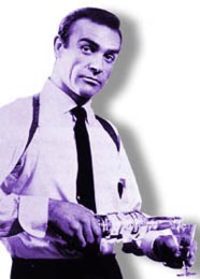 THE VESPER MARTINI
THE VESPER MARTINI
Judith likes vodka and I like gin. Next time we drink martinis, which I hope will be soon, we’ll have to have vespers. The delicious compromise is as follows…
“A dry martini,” [Bond] said. “One. In a deep champagne goblet.”
“Oui, monsieur.”
“Just a moment. Three measures of Gordon’s, one of vodka, half a measure of Kina Lillet. Shake it very well until it’s ice-cold, then add a large thin slice of lemon peel. Got it?”
“Certainly, monsieur.” The barman seemed pleased with the idea.
“Gosh, that’s certainly a drink,” said Leiter.
Bond laughed. “When I’m…er…concentrating,” he explained, “I never have more than one drink before dinner. But I do like that one to be large and very strong and very cold and very well-made. I hate small portions of anything, particularly when they taste bad. This drink’s my own invention. I’m going to patent it when I can think of a good name.”
-Ian Fleming, Casino Royale



